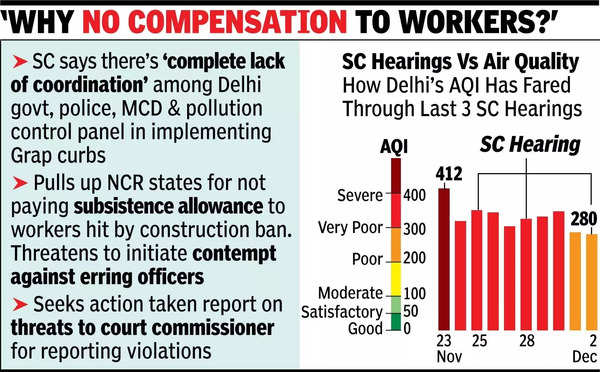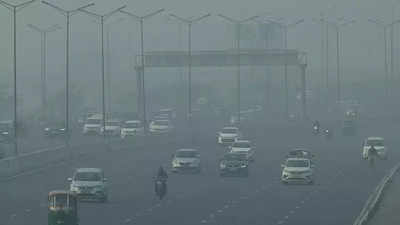NEW DELHI: Supreme Court on Monday refused to relax restrictions imposed under the Graded Action Response Plan (Grap) Stage 4 to check air pollution in Delhi and indicated that conditions would be relaxed only when pollution levels continue to show a downward trend.
A bench of Justices Abhay S Oka and Augustine George Masih took exception to a court-appointed commissioner being threatened for discharging his duty and sought an action-taken report from Delhi Police on his complaint. It said pollution levels kept rising between Nov 27 and 30, and decided to wait for a few days before relaxing the stringent conditions. The bench said it would take a decision on Grap restrictions on Dec 5.

Noting that Delhi-NCR invariably faces an air-quality emergency every year between Oct and Dec, the apex court said it would go into all aspects of the air pollution problem and find a permanent solution. It highlighted the “complete lack of coordination” among stakeholders, including Delhi govt, Delhi Police, Municipal Corporation of Delhi and the pollution control committee, in implementing the restrictions. The court also pulled up NCR states — Delhi, Rajasthan, Uttar Pradesh and Haryana — for not taking steps to pay subsistence allowance to workers affected due to ban on construction work. It directed the chief secretaries of all NCR states to appear before it virtually on the next date of hearing.
“Only if we summon the top officers will the ball start rolling,” the bench said after counsel appearing for states pleaded that no order be passed against the chief secretaries.
“We make it clear that unless substantial compliance with actual payment of amounts to construction workers is reported, we will have to consider initiating action under the Contempt of Court Act against erring officers,” it said.
Taking note of advocate Manan Verma’s submission that he was being targeted for discharging his duty as court commissioner to report violations of Grap-4 measures, the bench asked additional solicitor general Aishwarya Bhati to brief the court about the action taken on his complaint.
The Commission for Air Quality Management had urged the court to relax the stringent conditions in view of prevalent air quality forecast but the bench turned it down. In an affidavit, the commission had asked the court to consider moving from Grap-4 to Grap-2.
